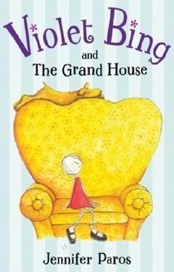Out Loud and Visible: Not a Target But a Light
by Jennifer Paros
“The opposite of depression is expression.”
When I was a girl, starting around the age of seven or so, I wanted my clothing to say nothing – to make no statement, to remain a silent participant in my presentation. I preferred dark greens, navy blues, and anything muted. I remember once trying on shoes and feeling uncomfortable with an inch-high heel, which made me feel as though I were looming and conspicuous. In no way was it my desire to arouse the impulse in others to notice me.
This fashion sensibility maintained its grip for many years, loosening now and again for special occasions, and relaxing slightly in high school. I wanted to express something more but feared I would be trying to be something I was not, and that humiliation would follow. Without realizing it, I feared that free expression would make me a target.
In truth, we are never a target: we are always a light. We are created to shine and we work either with or against that reality. When we try to protect the light, we obstruct it. When we adhere tightly to what we’ve been expressing, we hamper our ability express more. Our willingness to acknowledge a bigger picture of ourselves allows the whole of who we are to find greater expression. We are not what we’ve done or thought, or our previous perceptions of ourselves, or fears about ourselves, and we are never without purpose and value. In quiet moments in which the rollercoaster of our thoughts is slowed, we can find ourselves just as we might find a rabbit in the woods or a seashell by the ocean; we find ourselves in and through our natural state – love.
During my high school years, I employed a stand-in in my daydreams. I’d seen a picture of a young woman with long red hair and blue eyes, and I used her image as my representative (though my hair and eyes are dark brown). I even gave her a different name. But still I looked through her eyes as my own, felt what she felt, and spoke my words through her. And when she received compliments – which she most certainly did – they were for me. This way I could feel about myself the way I wanted. It gave me a hiatus from my negative self-judgments. These daydreams allowed me to spend time appreciating me – appreciating my light, rather than feeling bad about the story I was usually telling about myself.
“Don’t allow the little stuff of your life to obscure the divinity of who you are.”
Louise Hay, founder of Hay House Publishing and self-help author, once suggested we ask ourselves, “What’s it like to be me when I’m not judging myself?” My daydream stand-in provided me with an answer to that question. For years I thought she was just sad testimony to my high level of self-rejection, but instead she served as both a placeholder and a bridge for me – as I, bit by bit, started shifting to an acceptance of a bigger and kinder picture of myself.
There has been a lot of discussion about how artists and writers are made vulnerable by sharing their work and “putting themselves out there” – in a sense making them potential targets. But anything can be used as a target. We may take aim at a tree, but it still remains inherently tree, not target. It’s so important to identify ourselves properly. We are the light behind the work. We focus and translate and share the results of creativity in action – which can never be defined by external opinion. There is no value in allowing worry over someone else’s thoughts to inhibit our own expression, when the only honest job of the words of others is to fully express themselves.
When I was a kid, I wanted to be somewhat invisible only because I misunderstood what I was. At that time, I believed the story of not being good enough and was hoping to camouflage myself in dull-colored clothing so no one would notice, target, and attack me. I had dimmed my own light through fear. As long as I identified with the not-good-enough story, I felt the need to both reject and protect myself. Accepting ourselves means accepting the good we are. It also means accepting this genuine goodness is never a target; it’s always a light. It is not our job to protect ourselves, but to be more of ourselves – out loud, visible, and all lit up.
Jennifer Paros is a writer, illustrator, and author of Violet Bing and the Grand House (Viking, 2007). She lives in Seattle. Please visit her website.

